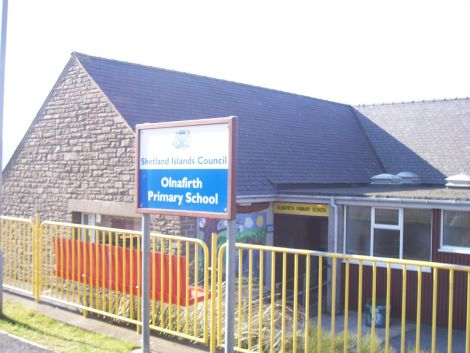News / Countdown to school closures begins
SHETLAND Islands Council hopes to save just over £167,000 per annum by closing two small schools in the north of the islands.
On Monday, the council published its proposals to close Olnafirth primary school, in Voe, and the secondary department of Skerries School, as of summer 2014.
In the case of Olnafirth £91,309 is expected to be saved by transferring pupils to the Brae High School primary department, five miles north of the village.
Skerries’ secondary pupils are set to attend the Anderson High School, and stay in hostel accommodation in Lerwick during the school week. This would amount to savings of £76,336, council officials said.
Both schools are the first of four secondary schools and five primaries to be scrutinized under plans to slash the size of Shetland’s school estate to save £3 million.
A consultation period with parents, staff and communities will last until 28 June with councillors expected to make a decision on the future of these schools by the end of the year. More details about how to respond to the consultation can be found here.
A series of public meetings to discuss the proposals with the communities affected has been organised at:
- Anderson High School – Tuesday 28 May, from 7 to 9pm;
- Voe Public Hall – Wednesday 29 May, from 7 to 9pm;
- Brae High School – Thursday 30 May, from 7 to 9pm;
- Skerries Hall – Friday 7 June from noon to 2pm.
Olnafirth Primary has currently a school roll of 13 which equates to an average cost of education per pupil of £13,413, more than three times the Scottish average for primary education, and still twice the average local cost.
The council’s school service said the school roll at Olnafirth had been fluctuating over the last ten years but was recently declining. As of summer there will be only eight pupils in the school, growing again to 12 in 2014/15.
Become a member of Shetland News
The report also said that the school with room for 125 pupils was underutilized and operating at just 10 per cent of its capacity.
Officers said that closing the school and moving the pupils to the primary department in Brae would provide the following benefits to pupils:
- being educated in a modern fit for purpose learning environment with dedicated social and dining facilities; and adequate toilets;
- the elimination of two transitions if pupils are moved to Brae High School Primary Department;
- daily access to a larger peer group of similar age, stage and gender;
- creating a more viable cohort of children for a variety of group and team activities;
- access to a larger teaching staff group who are able to work collaboratively to benefit each pupil’s learning;
- larger staff provision which creates more collegiate time to commit to the school improvement agenda;
- more efficient use of financial resources.
The latest round of consultation is the sixth attempt by the SIC to close the tiny secondary department on the island of Skerries since 2000.
Currently there are three pupils in what is the smallest secondary school in Scotland.
In their report, council officials said the benefits of educating Skerries’ secondary pupils at the Anderson High School were significant:
- a significant increase in curricular opportunities at all levels and stages;
- increased access to a wide range of specialist subject teachers;
- more staff, including principal teachers, offering a wide range of expertise and allowing better and consistent quality assurance of an individual learner’s progress;
- improved access to resources, including specialist subject resources, information communication technology, physical education, sports and leisure, after-school activities, library, social groups, clubs and societies and school trips and exchanges;
- the best possible timing of transition from a broad general education to the Curriculum for Excellence senior phase;
- access to a larger peer group of similar age, stage and gender;
- access to a larger teaching staff group who are able to work collaboratively to benefit each pupil’s learning;
- larger staff provision which creates more collegiate time to commit to the school improvement agenda;
- staff who have better access to continuing professional development and peer interaction;
- more efficient use of financial resources.
They added that they council was no longer in a position to fund the current schools model.
“Up until recently, Shetland Islands Council has been in a position to use reserves to support the school estate within this community in terms of the numbers of schools and the levels of staffing within them.
“As a result, Shetland provides high-quality education to all its pupils as evidenced in almost all reports by Education Scotland.
“However due to spare capacity and high levels of staffing, this comes at a significantly higher cost per pupil than the Scottish average.”
The council’s chairwoman of the education committee Vaila Wishart, said: “We would encourage everyone to participate in the statutory consultation process, attend the meetings and send in their views, particularly those affected by these proposals.”
Consultation on closing Aith and Sandwick secondary schools begins in September this year.
The primary schools in Burravoe, North Roe and Urafirth, including its nursery department, will be scrutinized during 2014, to be followed by Whalsay secondary school and Sandness primary school in 2015.
Become a member of Shetland News
Shetland News is asking its readers to consider paying for membership to get additional perks:
- Removal of third-party ads;
- Bookmark posts to read later;
- Exclusive curated weekly newsletter;
- Hide membership messages;
- Comments open for discussion.
If you appreciate what we do and feel strongly about impartial local journalism, then please become a member of Shetland News by either making a single payment, or setting up a monthly, quarterly or yearly subscription.



































































